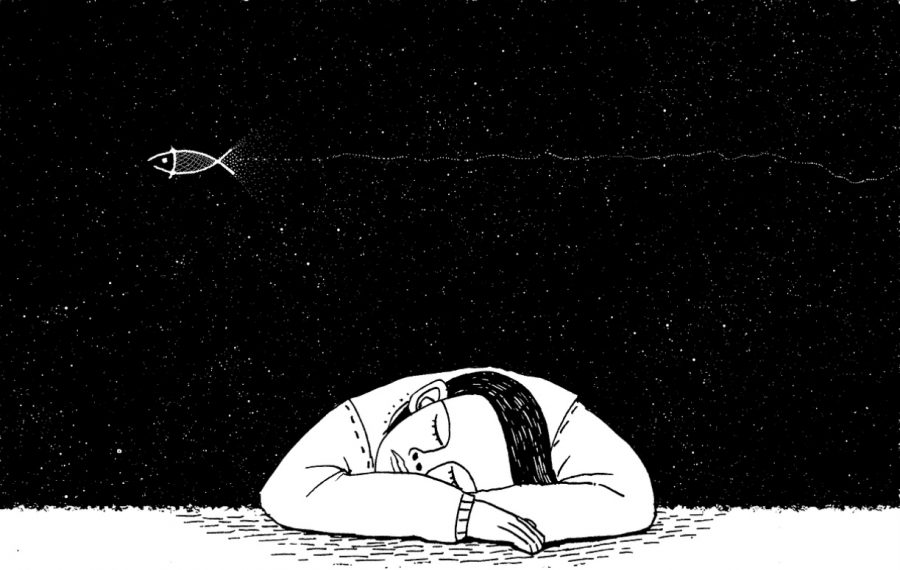The Big Sleep
Think about how many hours of sleep you got last night. Not good, right? Here are some potential ways to change that.
As a high school student who is swamped with college applications and clubs, all while trying to maintain a social life, I can confidently say that sleep deprivation is a real issue. At its simplest, sleep deprivation is the situation or condition of suffering from a lack of sleep. While this may seem inconsequential to some, studies show that 73% of high school students are sleep deprived. So, let’s take a closer look at sleep deprivation amongst high schoolers and maybe even find some ways to combat it.
In terms of teenagers, getting anywhere below the standard eight to ten hours of sleep is considered sleep deprivation. Well, you may be wondering, how many hours of sleep does the average teenager get? That number falls somewhere between six and a half to seven and a half hours of sleep. Admittedly, the difference between the average teenager and the recommended amount doesn’t seem huge, but if you go a whole school week running on six and a half hours of sleep, by Friday, your body will have gone without roughly seven and a half hours of needed sleep. And while we’d like to believe that we can just catch up on sleep over the weekend, it isn’t a very realistic game-plan.
But so what?
We’d just be a little crankier in the mornings without those extra hours, right?
Wrong.
Sleep deprivation can cause a boatload of issues for anyone, but the problems manifest in their most negative forms with high school students. Whether it be anxiety, emotional disturbances, or a drop in grades, the effects of sleep deprivation are considerably worse than you’d probably assume. So, if the effects of sleep deprivation are so detrimental to teenagers, why isn’t the issue brought up as frequently as it should be?
This is probably because most teenagers are hesitant to admit that they’re actually suffering from sleep deprivation. We like to think that we’re bigger than most issues like this, but alas, we’re not. So instead of ignoring the problem, let’s take a look at some ways to reduce sleep deprivation.
The first way to fight back against sleep deprivation would be to stay productive with homework and other school assignments. There’s nothing worse than getting ready to fall asleep when suddenly you remember that you forgot to take notes for tomorrow’s history class. You either end up taking notes for two hours, or stressing about it until you fall asleep, prolonging the amount of time that you’re awake either way.
The way to avoid this would be to stay on top of your schoolwork, whether through keeping an agenda or setting reminders on your phone. You can even check what due dates you have coming up in Google Classroom in the “To-do” section.
Another way to deal with sleep deprivation is to limit late-night snacking. Nothing pushes a night of sleep back a few hours like an oatmeal cream pie and a Coke around 9:00 P.M (my go-to late night dish). However, this alone is 310 calories and 61 grams of sugar.
As nice as it is to have a snack like this before bed, the negative impact it has on your body far outweighs the temporary joy it brings you in the moment. Pushing the snack back to around 7:30 or 8:00 gives your body the chance to come down from the sugar rush in time to get enough sleep to be up at 6:00 or 6:30.
By my estimation, the greatest cause for sleep deprivation amongst most teens is due to phones. Whether it be Snapchat, Twitter, or TikTok, social media contributes to sleep deprivation in more ways than one. In a pure scientific sense, the blue light given off by phones affects our melatonin levels more than any other wavelength. According to sleepstation.org, “it signals to your brain that it is daylight, melatonin production is suppressed and sleep becomes delayed.”
In addition to this, the stress and anxiety alone that comes with social media could keep someone up for hours on end. I think it’s fair to say that all teens have experienced FOMO (fear of missing out) at least once, but scrolling through Instagram and seeing your friends live it up while you’re getting ready for bed is sure to get your brain pumping. The biggest way to deal with this is just to resist the urge to go on your phone entirely. Hear me out!
Of course it seems hard to completely power off social media around 9:00 every night, but your body will certainly feel better. And it isn’t like you can’t do anything in that time instead. Try reading a book, listening to music, or even just having a talk with your family. While it may seem annoying at the time, trust me, your body will thank you.
So there you have it! While the tips above are helpful, they certainly aren’t the only ways to combat sleep deprivation. While I know firsthand that getting sleep in high school is not easy, as long as you’re trying your best to be conscious of it, you’re doing the right thing. At the end of the day, you just need to find a routine that works best for you. Thanks for reading and get some rest, okay?



